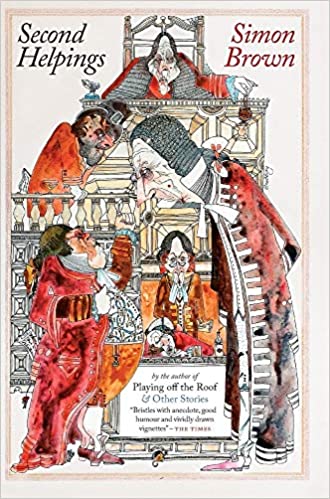Book Review by Master Gerald Barling
It is rare for a sequel to match up to the original work. Master Simon Brown’s Second Helpings (Marble Hill Publishers Ltd. 2021) is an exception: in pure entertainment value and as an intimate perspective on the life and career of one of the leading lawyers of our time, it is at least the equal of the author’s first volume of memoirs, Playing off the Roof & Other Stories, published to acclaim in 2020.
Having there achieved what Bertie Wooster would call the ‘preliminary spadework’ of family history and career progression, this follow-up volume permits the author to range more widely around topical issues with compelling clarity and frankness, as well as serving up some choice anecdotes omitted from the original work. The structure is only loosely chronological, with digressions when a relevant story suggests itself.

On a revisit to his National Service, we learn of the young Master Brown’s awakening to the ways of the world. Posted to Cyprus during the Suez crisis, he was required to censor the men’s mail. One writer’s missive to his sweetheart revealed to the innocent reader does not state secrets but thitherto unimagined sexual gymnastics described in considerable detail, the soldier finally commenting that he would have been even more graphic but for the fact that the letter would be read by ‘some snotty-nosed young officer’. Further army adventures include his role as mess officer in charge of the regimental bar (not a success), as transport officer (more successful, despite ignorance of the workings of military vehicles), and encounters with John Mills and Richard Attenborough when providing real soldiers for the filming of Dunkirk on Camber Sands in 1957.
At Oxford (Worcester) he changed from history to law but attended not a single lecture on that subject, preferring understandably to hear the likes of Isaiah Berlin, A.J.P. Taylor and Hugh Trevor-Roper. He devoted a good deal of time to hockey (captain of his college first team), tennis and cricket (captain of Worcester’s Rustics). He neither rowed nor punted – omissions he regrets. In contrast to the first volume, there is scant reference to the author’s lifelong passion for golf. The exception is an account of a mishit drive on the 17th at Church Stretton in Shropshire, when a crow flew across the fairway, picked up the ball and disappeared.
Oxford long vacations provided the author with further insights into human nature. We hear of a summer in New York when he swapped plush upstate accommodation with a wealthy Wall Street lawyer for edgy Manhattan lodgings and a job stacking shelves. When entertained by a good-looking divorcee in her Park Avenue apartment, in which he was introduced to Alistair Cooke (Letter from America), he failed to recognise his hostess’s attempted seduction. Another vac saw the author hitch-hiking to Istanbul via Portofino, Naples and swimming the Bosphorus from Europe to Asia.
A recurrent theme is the art of after-dinner speaking. Despite his consummate skills, much of the material is modestly confined to the expertise and bons mots of others, with only one or two examples of his own, plus some useful tips: ‘Any competent after-dinner speech… requires not less than an hour’s preparation for each minute of speaking time’. Limited space now precludes a real taste of the richness of this vein, but – spoiler alert – the reader should on no account miss the reaction of the recently retired President of the Supreme Court, Lady (Brenda) Hale, when she was informed by a colleague that the Justices’ annual dinner had been arranged at the Garrick Club.
Spanning a legal career of more than 60 years and counting, this volume has something for everyone. Although the legal landscape was very different in the early 1960s when the author began in practice – pupils are no longer required to pay a pupillage fee of £150 to their ‘master- the rookie barrister of 2021 will readily recognise the hopeless bail application in a provincial magistrates court (‘The trouble is, Mr Brown, this new Bail Act just doesn’t seem to have caught on around here’), or the author’s arrival at Newcastle magistrates court fresh from the night sleeper only to discover that the case in which he was briefed was in Teeside 40 miles distant. Today’s barrister will also sympathise with the author’s occupational insecurity in anxiously scanning his chambers’ diary to see whether a solicitor had engaged him for a hearing – a habit he only abandoned in 1979 when appointed Treasury ‘Devil’, HMG’s top barrister, assured of a steady stream of high quality work.
Until then Brown’s practice comprised the full panoply of common law work, including crime, landlord and tenant, and personal injury – cases liable to produce a host of stories, of which we are treated to several. One records a seasoned solicitor’s clerk’s practical advice to a client seeking urgent help when the bailiffs came knocking: ‘Open the door, give them a fiver and tell them to f*** off’. In this period the author accepted a brief to defend the husband of one of the nation’s sex symbols, Diana Dors, on a charge of unlawfully wounding someone in a pub brawl. The case did not end well for the defendant, and in her memoirs Diana Dors was trenchant in criticising her husband’s barrister. The barrister is disarmingly frank in endorsing the criticism, confessing that he was ‘inexperienced’ and ‘absurdly over-confident and optimistic’. Such humility is rarely seen.
Much of the second half of the book is devoted to experiences as a High Court Judge, Lord Justice of Appeal and Law Lord (later Supreme Court Justice). These tales, which include life in Judges’ lodgings on circuit in the 1980s (entertaining the retired Lord Denning to dinner and sharing lodgings with Georgette Heyer’s son and P.G. Wodehouse’s step grandson), make unmissable reading for lawyers and laymen alike. There are tales of eccentric judges, gruesome murder trials and of a courageous change of mind on a sentence already passed. Only modest mention is made of the author’s many landmark judgments, particularly in the public law arena where he is most at home. He singles out one in which he expresses pride: in Joint Council for the Welfare of immigrants the Court of Appeal quashed Home Office Regulations which had excluded certain categories of asylum seekers from all state benefits. This decision preceded the incorporation into English law of the ECHR and was a theme to which he returned a decade later in the HL.
The author comments on other issues of current interest, including the scope of the right to protest (Extinction Rebellion and Black Lives Matter) and the role of referenda in a modern democracy (Brexit). In the latter context he recounts against himself the story of his admonishment by Lord (Nigel) Lawson for advocating the abolition of plebiscites. He explains why the ‘dismemberment’ of the office of Lord Chancellor by the Constitutional Reform Act 2005 has left the judiciary, and the rule of law, unprotected, and why dissenting judgments are valuable to litigants and the public. He regrets that in Miller 2 there was no dissent and that the Supreme Court did not properly explain why they differed so profoundly from a unanimous decision of the Divisional Court (the Lord Chief Justice and two other very senior judges) that interference by the courts with parliamentary process was there inappropriate. Finally, he discusses the value of juries, and wonders whether the current crisis in the administration of criminal justice should trigger more trials by judge alone.
Quite apart from large portions of wit and anecdote, the real meat of this feast is the insight into a lengthy, successful and obviously happy career at the Bar, on the Bench and now in the House of Lords. The author’s affection for the institutions with which he has been associated – notably Oxford, the Bar and Judiciary, the Middle Temple, the House of Lords and the Garrick – shine through the pages. Above all the author places value on people: he is unremittingly gregarious, enjoying the company of a vast circle of friends, colleagues and acquaintances, many of whom have a place in this memoir. Covering the world of law and politics in a chatty fireside style, spiced with a little gossip and much wisdom, Second Helpings is a delightful read.

Master Gerald Barling was Called to the Bar by the Middle Temple and appointed QC in 1991. After practising at Brick Court Chambers, he joined the High Court Bench, was President of the Competition Appeal Tribunal and Vice-Chancellor of the County Palatine of Lancaster. He is married to Myriam. They have three daughters and live in Shropshire.

